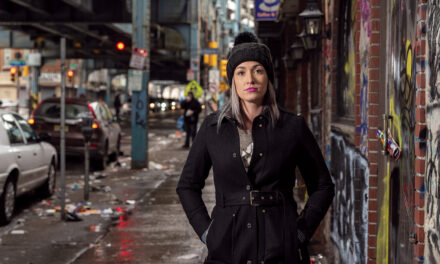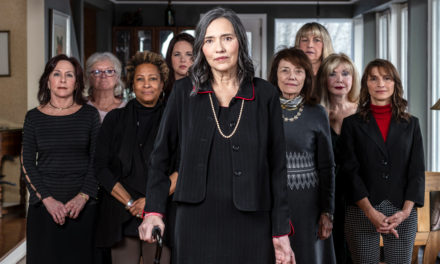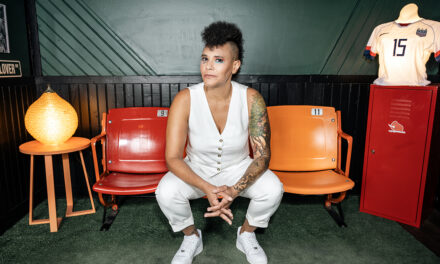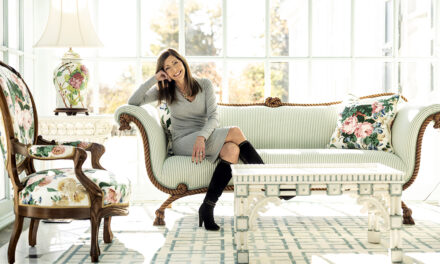After suffering the loss of her husband to ALS, Jodi O’Donnell-Ames turned her grief into action, creating a network of camps that provide a respite for kids with loved ones suffering from the disease.
Real Woman Revealed Episode 03
Nate shifts from one foot to the other as he stands in front of the camp clubhouse in Stillwater, N.J. At 15, his thoughts are still occupied by video games and goofy jokes, despite his own body and certain life events pushing him toward adulthood. He’s warm and approachable, with an easy smile and an earnest manner that can be disarming when you first meet him. Clad in summer-camp attire—dark sweat pants, dusty sneakers, and a blue “Swag Don’t Come Cheap” T-shirt—he takes in the last moments of a weekend that’s been loaded with climbing, storytelling, fishing, hiking, and plenty of laughter. In a short while, Nate (not his real name) will head home to bury his mother, who died last week from amyotrophic lateral sclerosis (ALS), and it will be then that memories of this weekend will be his salvation, something sweet to savor as the bitter pain of loss threatens to overwhelm him.
In front of him stands a line of 30 or so fellow campers, counselors, and parents, who are all too familiar with what Nate is going through. They share the enormous grief that comes from having a family member with ALS (also known as Lou Gehrig’s disease). And as the line advances, each person wraps their arms around Nate to give him a deep, comforting hug. Some of them cry, others clasp his hand or give him a fist bump, and a few softly offer words of support that only he can hear. Let us hold you up just for a moment.
Like thousands of other children who’ve been touched by the disease, Nate had to grow up fast when his mom was diagnosed 3 years ago. As he helped her cope with the toll the disease was taking on her body, their roles shifted, with the burden of caretaking easing off her weary shoulders and on to his. While the disease is rare—a little over 6,000 people in the U.S. are diagnosed with ALS each year—its impact is devastating. It steadily destroys nerve cells in the brain and the spinal cord, causing loss of muscle control throughout the body, gradually taking away a person’s ability to accomplish simple tasks like walking, speaking, swallowing, and eventually breathing. ALS is terminal, and those who suffer from the disease require around-the-clock care. “When you live with ALS, so does your family,” says Jodi O’Donnell-Ames, founder of Hope Loves Company (HLC), the Pennington, N.J.-based nonprofit behind the 3-day camp in Stillwater and four other locations across the country. “The disease can make children feel isolated.”
She started HLC with one goal in mind: to give these children a place to be kids again, even if it’s just for 3 days. The camps are free for children between the ages of 6 and 21 who have, or have had, a loved one with ALS. They come to let their guards down, sleep in log cabins, and just play, talk, and laugh. Along with team activities and support sessions, children who attend camp learn strategies for coping with the stress that comes from taking care of parents or other family members with the disease. “Kids want to be around other kids,” says O’Donnell-Ames. “And so much can happen when they’re helping each other heal.”

I found out about HLC after my dad passed away, and I couldn’t believe they had a whole camp for kids like me. I love hanging out with the other kids and talking about what they’re going through. —Jayden Perloff, 12
Early Signs and Symptoms of ALS
- Difficulty walking or doing your normal daily activities
- Tripping and falling
- Weakness in your legs, feet, or ankles
- Hand weakness or clumsiness
- Slurred speech or trouble swallowing
- Muscle cramps and twitching in your arms, shoulders, and tongue


In May 2017, children with a parent affected by ALS joined together for Camp HLC in New Jersey.
Children in need
O’Donnell-Ames lived for years with the enormous grief that comes with ALS. In 1995, her husband, Kevin O’Donnell, was diagnosed with the disease when he was only 29 years old. They were 2 years into their marriage and had just started a family. “I was standing there with Alina, my daughter, in my arms when they told us that he was terminally ill,” she says. It was devastating. O’Donnell-Ames leaned on her family and her in-laws for strength, promising to meet the challenge as a family and to remain positive. “What I’ve found is that people who don’t have hope lose their battle quicker,” she says. “Hope is powerful. And love is powerful.”
She focused on remaining positive as they all learned how to live with ALS. Two years in, Kevin was confined to a wheelchair and needed constant assistance with everything from shaving to getting dressed. Another year later, and he could no longer chew or swallow—he needed a feeding tube and, eventually, a ventilator. In 2001, at the age of 35, Kevin lost his battle with ALS, passing away with his family gathered around him. “Kevin told us to look for him in the sky because he would be the last star of the Big Dipper,” says O’Donnell-Ames. “He said we would find him there every night.”
In the years that followed, she started working for the ALS Hope Foundation, coordinating fundraising and family events. “I was planning this family event at Waterloo Gardens in Exton, Pa. for children who had grandparents living with ALS,” says O’Donnell-Ames. “And I wanted to find a children’s book to share with them.” That’s when she came across What Did You Learn Today?, a book written to help children understand the illness. The author, Tina Singer Ames, had created it for her two children before she died of ALS in 2000. “I ordered 50 copies for the children and grandchildren who came to that event to take home as a gift,” she says. “Tina Singer Ames’s husband, Warren Benton Ames, and her two kids, Adam and Nora, came to the event and delivered the books in person.”
Two years later, O’Donnell-Ames and Benton Ames were married. “It was our children who brought us together,” says O’Donnell-Ames. “In the middle of all the sadness were a boy and a girl who needed a mom, and another girl who needed a dad. So, we just became a family.” The kids were all around 10 when the two families merged, and they bonded instantly. O’Donnell-Ames says soon after she and Benton were married, Nora turned to her in the middle of a grocery store and asked, “Now that you’re my mom, does that mean you take care of everything I need?” O’Donnell-Ames said yes. “Nora knew that she could stop being a mother and become a child again,” she says. “For a 12-year-old, she had been worrying beyond her age.”
As she raised three young kids and helped them heal, O’Donnell-Ames discovered some of the complicated ways children dealt with loss. From anger to withdrawal to immense sadness, there were so many facets to their grief. “My son woke up on his 13th birthday wanting to know who his mother was,” says O’Donnell-Ames. “And one of my girls didn’t start the grieving process until she went to college.” More than anything, the children leaned on each other for support. But when O’Donnell-Ames looked around for resources to help them navigate their loss, she found nothing. “It’s like someone has forgotten about these children.”
O’Donnell-Ames decided to develop the resources she wished were available for her children, launching Hope Loves Company in 2012 to help kids navigate living with, and losing a parent to ALS. She also wrote a children’s book on living with a disabled or terminally ill parent and edited an ALS caretakers guide. “I’ve been a teacher, I’ve been a nurturer, I’ve been a foster parent, and I have been a nanny,” she says. “Children have always been my thing.” Besides the camp, HLC provides books, care packages, support sessions, and educational tools for parents and grandparents coping with ALS to utilize with their children and grandchildren. One of the first things O’Donnell-Ames did once she got HLC up and running was reprint Tina Singer Ame’s book. “Nora and I would go to the local libraries and put them there. Then we started sending them out,” she says. “When people responded, I realized there was so much more to this. And I’m still realizing how much more needs to be done.”

When you live with ALS, so does your family. The disease makes children feel isolated. Our whole purpose for these children is to realize they are not alone. —Jodi O’Donnell-Ames
A New Hope
O’Donnell-Ames attributes the powerful response to the shared experience of losing a loved one to such an unrelenting disease and the feelings of helplessness that so many family members are confronted with. “The thing is, you can’t fix anything. You just have to learn how to live with it, how to deal with it, and how to keep moving,” says Jeannette Senerchia, whose husband was diagnosed with ALS 14 years ago. “There’s nothing to fix. We wish there was, but there’s not. It’s just dealing—learning how to cope. That’s been a challenge.” She brought her 9-year-old daughter to the Hope Loves Company camp after learning about it through the ALS Association. “She’s been asking to meet other children whose parents have this disease,” she says.
ALS has taken its toll on Senerchia’s husband, Anthony, an engineer and former Pop Warner football coach. He’s wheelchair-bound, requires around-the-clock care, and uses a machine that tracks the movement of his eyes to communicate. “All our daughter has ever known is him with ALS,” she says. “When we had her, Anthony was able to hold her sitting down. He would take her for walks and things like that because he was still really mobile.” Now, she says, he’s trapped in his body as it slowly fails him, which is devastating because he’s still completely alert.
Senerchia says being at Camp HLC has given her a chance to connect with other parents who are going through the same thing. “It feels good to be on the same page with someone who knows and can even validate a little bit of what you’re feeling,” Senerchia explains. Besides making candles and rock climbing, being around other children whose lives are touched by ALS has given her daughter some new perspective as well.
Jayden Perloff is another Camp HLC first-timer. “I found out about HLC after my dad passed away, and I couldn’t believe they had a whole camp for kids like me,” he says. “There’s so much to do here. I love hanging out with the other kids and talking about what they’re going through.” At 12, the Bensalem, Pa. boy is composed beyond his years. He’s able to speak frankly about the toll the disease took on his father and the invaluable time he got to spend with him up until the very end.
“Our whole purpose is for these children to realize they’re not alone,” O’Donnell-Ames says, adding that children don’t often know anyone else in their situation because ALS is so rare. By connecting with other kids, they broaden their support network and learn new ways to cope. Over the past 5 years, Hope Loves Company, which is funded through corporate sponsors and private donations, has hosted 8 camps in Massachusetts, Florida, Indiana, California, and New Jersey. “I keep thinking I can’t do this anymore, that I’m exhausted and can’t continue at this pace,” O’Donnell-Ames says. “And then something happens that reminds me that I have to keep going.”
More often than not, it’s a phone call from a wife or husband whose spouse is suffering from the disease, and they want to know how their kids can experience her camp. “So often I’m on the phone with someone going through this and they break down into tears because it is all so hard. And they just want to thank me for creating this camp for their children.” These conversations inspire her to keep going.
She’s also inspired by her own children, who are all out of college now, but have each become more involved in Camp HLC. “It makes what we’re doing more concrete,” says O’Donnell-Ames. “They think this work is important, too, and they wish that they had this camp when they were young.” Between her children and the older Camp HLC kids who are now coming back as shepherds to help, the tight-knit community of young people committed to HLC is awe-inspiring. “They’ve benefited from this experience,” she says. “And now it’s their time to pay it forward and help other children.”
Just when family members are starting to feel helpless, these camps offer them a chance to listen, offer a hug, or simply remind a child to look up to the sky at night and find that last star on the Big Dipper for comfort, and, of course, hope.

Bucket List
On July 16, 2014, Jeanette Senerchia dumped a bucket of ice water over her head and started something big. “My cousin sent me the challenge as a joke,” says Senerchia. “So, I did it and then my friends started doing it and our whole town did it and then it kept snowballing and kept going.” Senerchia’s husband, Anthony, suffers from ALS, which is why they both used the challenge to raise money to fight the disease. Her cousin’s joke turned out to be the first ALS Ice Bucket Challenge, which has since raised more than $115 million for the ALS Association, with $77 million going directly to researching a cure. “It was surreal because I got all these alerts on Facebook and my inbox—it was like boom, boom,” says Senerchia. “So many people all over the world did it.” The challenge requires people to either dump a bucket of ice on their heads or make a donation to charity. Most of the time, challengers do both, especially since the challenge is now an annual event running through July and August. The bucket Senerchia used to do that first challenge now sits in the Smithsonian Museum in Washington, DC.







Thank you so much for sharing our mission with others and for doing so with compassion, caring and professionalism!
Thank you Jessica, Sean and your whole crew for sharing Jodi’s story and the mission of Hope Loves Company. The article and layout is fantastic! Great job.
My co worker’s son is in the featured in the article Hope Loves Company. I am interested in receiving a copy. I also lost a loved one ALS
Hi Lisa. You can subscribe to the magazine here: https://realwomanonline.com/subscription
Congrats Jodi on your wonderful endeavor – HLC camp. I’m sure it has helped a lot of children and families. I did some work with children whose parents had ALS and called them CO-PALS, acronym for: Children Of People with ALS. You are welcomed to use the acronym.
Sending love and respect,
Mariah